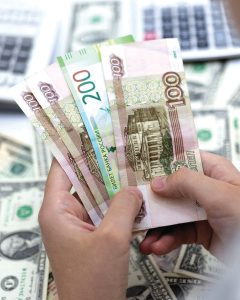BLOOMBERG
The Bank of Russia announced it will halt purchases of foreign currency on the domestic market for the rest of 2023 in an effort to help the ruble as the currency slumped toward 100 per dollar, its weakest in 16 months.
“The decision was made in order to reduce the volatility of financial markets,” the central bank said in a statement. The bank won’t buy FX on the domestic market as part of mirroring operations with the Finance Ministry under Russia’s budget rule, which was put in place to insulate the economy from swings in commodity prices. It will continue to sell foreign currency related to the use of funds from the National Wellbeing Fund, the central bank said. The ruble has weakened by about 24% against the dollar so far this year, placing it among the three worst emerging-market performers with the Turkish lira and the Argentine peso. The currency weakened past 98 per dollar during trading and is nearing 100 to the greenback, a level last seen during the first month after President Vladimir Putin ordered the February 2022 invasion. “The decision to suspend purchases should provide material relief to the falling ruble,” Bloomberg Economics Russia economist Alexander Isakov said. “The Finance Ministry’s FX demand has been light, but in the next four months it would have totaled an amount that Russia’s increasingly fragile FX market could not have handled well.”
The current account surplus — roughly the difference between exports and imports — declined to $25.2 billion in the first seven months of this year, down from $165.4 billion in the same period in 2022, data by the Bank of Russia showed. The surplus was $1.8 billion in July compared with $17.8 billion a year earlier, according to the bank.
Central bank Governor Elvira Nabiullina has repeatedly pointed to the deterioration in foreign trade conditions as the main reason for the ruble’s collapse, while ruling out intervention to support the exchange rate. The currency has almost halved in value from last year’s capital-control peak amid increased government spending, falling energy revenues and a move by Russians to put funds in foreign accounts.
The most recent central bank data showed that major Russian exporters sold 84% of their foreign exchange revenues on the market in June. But their proceeds — a key source of hard currency for Russia since the invasion — declined to just $6.9 billion in July from $16.8 billion in the same period last year.
 The Gulf Time Newspaper One of the finest business newspapers in the UAE brought to you by our professional writers and editors.
The Gulf Time Newspaper One of the finest business newspapers in the UAE brought to you by our professional writers and editors.
